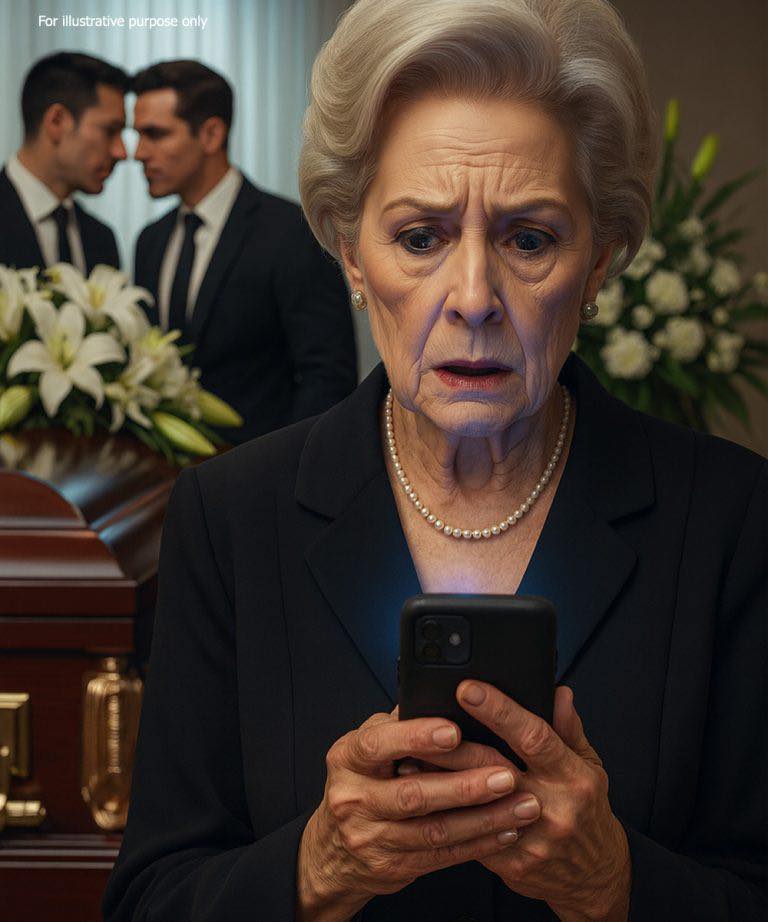The last toll of the church bell still vibrated in my ears when I left the cemetery, clutching the neatly folded American flag against my chest. Richard Miller had been lowered into the earth that morning beneath the oppressive gray sky of Seattle. The smell of damp earth clung to my gloves, and the drizzle settled into every seam of my clothes. Family and acquaintances drifted away, umbrellas bobbing like shadows, but I remained rooted at the graveside.
I thought grief would hollow me, but what I felt instead was unease, like the world had tilted slightly off its axis. Richard had died suddenly—a heart attack, they said. I replayed that phrase over and over, and each time it felt less true.
It was then my phone buzzed sharply in my hand.
“I’m alive. Don’t trust the children.”
For a heartbeat, I forgot how to breathe. My husband was dead. I had stood over his body in the sterile light of the hospital. I had touched his cold hand, listened as the coroner explained the cause. And yet the words glared up at me, undeniable, on the glowing screen.
Before I could convince myself it was a cruel prank, another vibration rattled the phone. A photograph appeared.
Richard’s study. His mahogany desk. The same desk Natalie had opened days ago, insisting she’d found the only will. A red circle had been drawn around the top drawer, and beneath it, a final message:
“The real will is in here.”
My hands shook violently, the phone nearly tumbling into the mud.
From the very beginning, something about Natalie and Andrew had unsettled me. Natalie, my eldest, had been efficient to the point of coldness, demanding that we move quickly with the estate. She spoke of funeral costs, property deeds, bank accounts—never of grief. Andrew, usually the gentler one, snapped when I suggested we slow down. Both swore that Richard’s affairs were in order. Both pointed to the will Natalie had discovered in the desk, which, conveniently, left everything to them.
I’d told myself their behavior was grief twisted into practicality. Now I wasn’t so sure.
That evening, after the mourners disappeared and the house grew hushed, I lit a single lamp in the living room and sat with my thoughts. The folded flag rested on the mantle, watching me like a silent witness. Upstairs, I heard my children moving about. Their doors shut. Their voices hushed.
I waited until the silence deepened into the steady creak of a house falling asleep. Then I crept toward Richard’s study.
The desk loomed in the half-light, a dark, immovable shape that seemed almost alive with secrets. My hands hovered over the locked drawer circled in the photograph. For years, Richard had guarded it with unusual intensity. I’d assumed it contained mundane things—contracts, business records. But now I couldn’t escape the weight of the message.
The lock yielded easily to the spare key I’d found years ago, tucked behind a row of books. The drawer slid open with a whisper.
Inside lay a sealed envelope. My name was written across it in Richard’s bold handwriting. My pulse hammered in my throat as I tore it open.
“If you are reading this, something has happened. Do not trust Natalie or Andrew. I fear they are not who I believed them to be. The will they will show you is false. My true wishes lie enclosed.”
My breath caught as I pulled out the real document. Unlike the other will, this one divided everything equally, but most importantly, it entrusted me as the primary executor and beneficiary. There was no mention of handing the estate wholly to our children.
But the envelope held more than a will. Tucked behind the papers was a photograph: Richard in his office, taken within the last month. He was alive in it, smiling faintly at the camera. The back was dated just days before his “death.”
I sank into the desk chair, my mind spiraling. If Richard had feared our children, had he faked his death to escape them? Or had someone forced this outcome upon him?
A floorboard creaked behind me.
I whipped around. Natalie stood in the doorway, her silhouette sharp against the hall light. Her expression was unreadable, but her eyes darted to the open drawer, then to the papers clutched in my hand.
“You shouldn’t be in there, Mother,” she said softly, though her tone carried a razor edge.
Behind her, Andrew appeared, his arms crossed tightly. Together, they stepped into the room, their presence suffocating.
I tucked the envelope against my chest. “Your father left this for me,” I whispered.
Natalie’s smile was thin, brittle. “Father is gone. That’s all you need to accept. Don’t make this harder than it has to be.”
But as she spoke, I saw it—fear flickering behind her composure. She knew what was in my hands.
The tension stretched between us like wire ready to snap. For the first time, I realized the danger wasn’t only in what the will contained—it was in what Richard might still uncover. If he was alive, as the messages claimed, then the game was only beginning.
That night, I did not sleep. I hid the will beneath the floorboard in my room, every sound in the house magnified a hundredfold. Natalie’s footsteps lingered outside my door once, twice, before retreating. Andrew’s voice murmured with hers in hushed tones.
I stared into the darkness, clutching the memory of Richard’s handwriting and the impossible promise of his message: I’m alive.
Was it true? Or was someone manipulating me to tear my family apart?
Either way, I could no longer trust the faces that once called me mother.
And I knew with chilling certainty that the next move would be mine.
